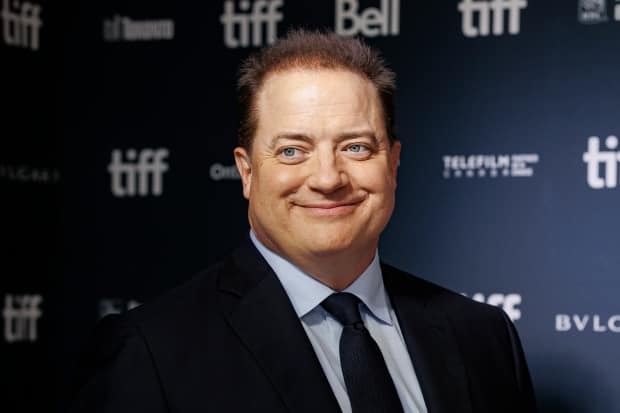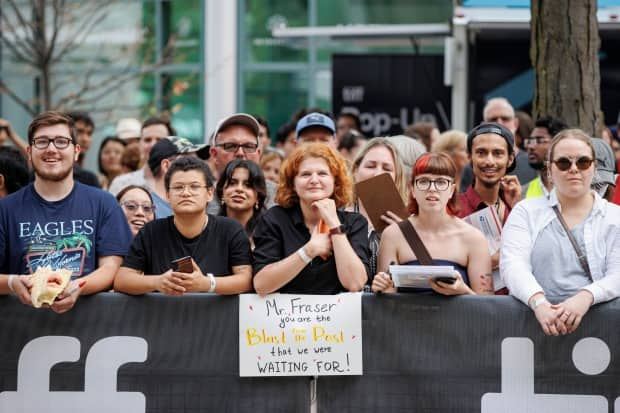Brendan Fraser brings career-defining role for the American-Canadian actor to TIFF

Call it a Brenaissance.
When director Darren Aronofsky was searching for an actor to play the lead role in The Whale — a film about a 600-pound recluse desperately trying to reconnect with an estranged daughter and heal from his traumatic history — he wasn't really familiar with Brendan Fraser's work.
Sure, the actor was one of the most recognizable leading men of the 90s — think Encino Man, School Ties and George of the Jungle — "but that was the generation after me, those films," Aronofsky told CBC's Eli Glasner. "So I didn't even know what his acting skill was.
"And then randomly … I caught the trailer to a low budget Brazilian film in Portuguese, and Brendan had a supporting role, and it was one of those light bulb moments. I just felt it."
Fraser, a 53-year-old American-Canadian actor, who lived in Ottawa and Toronto (among other places) with his family during a nomadic adolescence, finds in The Whale a possibly career-defining role after more than a decade of low-profile performances and a series of injuries, including multiple surgeries on his back, knees and vocal cords.

He stars opposite Sadie Sink, known for her role as Max in Netflix's Stranger Things. Aronofsky called the 20-year-old actress a "firecracker."
On the TIFF red carpet Sunday, ahead of the film's North American premiere, Fraser said he was blown away by the prosthetics made by Montreal costume designer Adrien Morot.
"The first time I saw his creation on a mannequin, I thought it was on loan from, like, the Tate Modern," he told CBC's Lisa Xing. "It was so striking, so arresting. It's almost like he did my job for me in so many ways because I needed only wear it to play a man so encumbered by the trauma that he feels."
The actor worked with the Obesity Action Coalition to ensure that the subject matter was treated with sensitivity, he said. While not directly autobiographical, the story is partially based on playwright Samuel D. Hunter's experiences.
WATCH | Fraser describes his physical transformation in The Whale:
"It's set in my hometown in Idaho where I was a gay teenager going to a religious school that taught that homosexuality was a mortal sin," said Hunter, who adapted his 2012 play for the screen.
"Early on I started self-medicating with food. I got to be very big," the writer added. "I mean, of course, a lot of people are big and happy and healthy, this is just my story – no one else's … I was scared to write it.
"I'm glad that I didn't know that this would happen," he added of the film's high-profile reception, "because I would've been too scared to write it, but I'm glad I did. And I'm glad that I could give it to Brendan."
PHOTOS | Stars shine on TIFF red carpets:
Actor has a 'Canadian goodness,' director says
The actor has been greeted with an outpouring of support on the internet and in real life, as seen during a recent viral video from the Venice International Film Festival, where he received a six-minute standing ovation following The Whale's world premiere.
"There's a fundamental – shall we call it a Canadian goodness — about Brendan that just sort of rings through and charms people," Aronofsky said.
"Look, I haven't really talked about this. But I had no idea the amount of love and good will for Brendan when I started this process. That was not part of my calculation."

Still, make no mistake: Fraser would rather talk about the character than himself.
"Charlie is a man who is living with a great deal of regrets. He's been alone in his two-bedroom apartment, he has a great deal of trauma in his life. And that's manifested by his need to eat to comfort himself to such an extent that he wears that on his corporeal being," the actor told Glasner in an interview ahead of the film's appearance at the Toronto International Film Festival.
Fraser went on to say he doesn't identify with the character's issues.
"I did feel a sense, when shooting this film, that given the time that it was made during lockdown — I think we all felt like this may be the very last time that we ever get the privilege of doing this kind of work," he said.
"So there was a certain degree of courage and abandon that we brought each day to it. And we wound up taking care of each other so much more. And I think that really shows through in the quality of the film."


